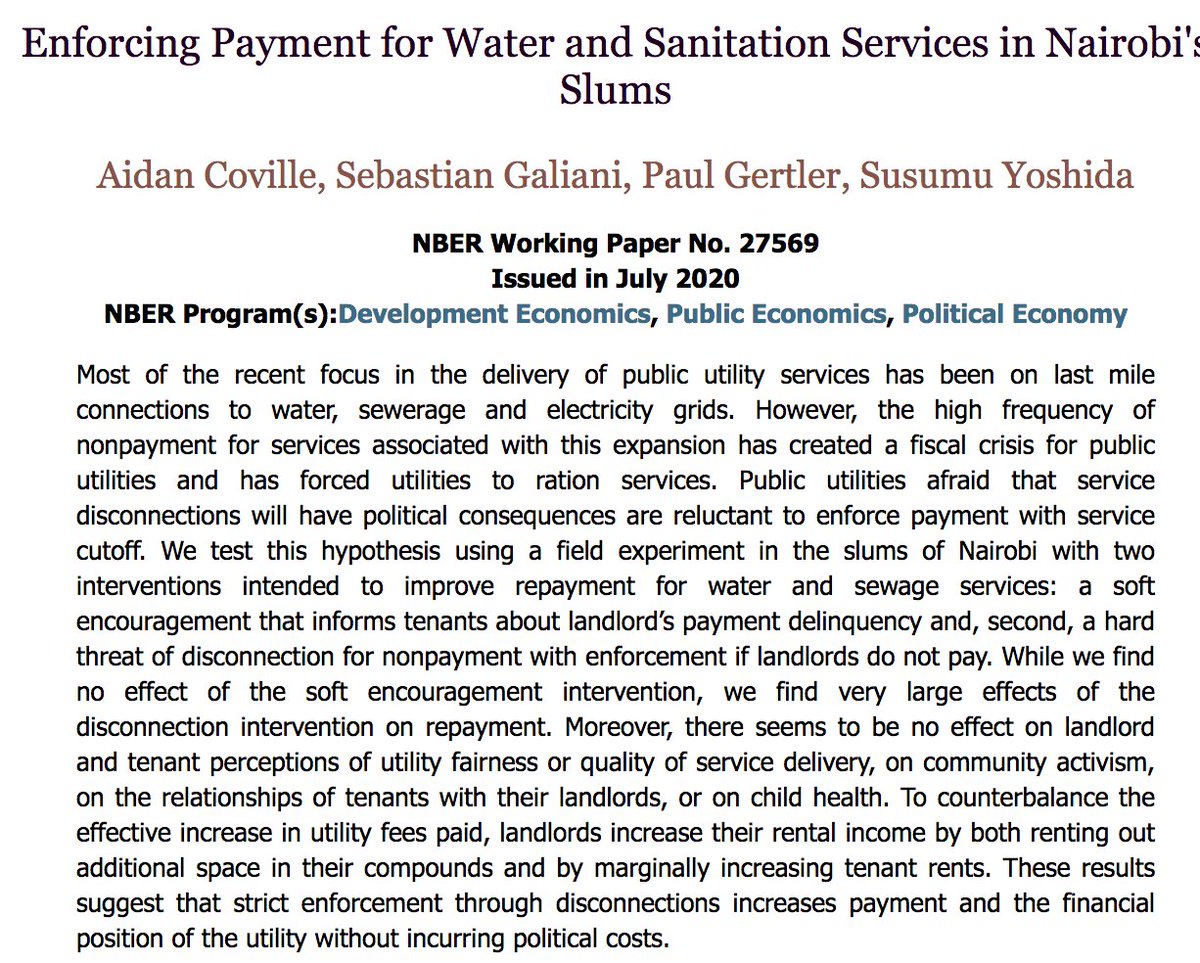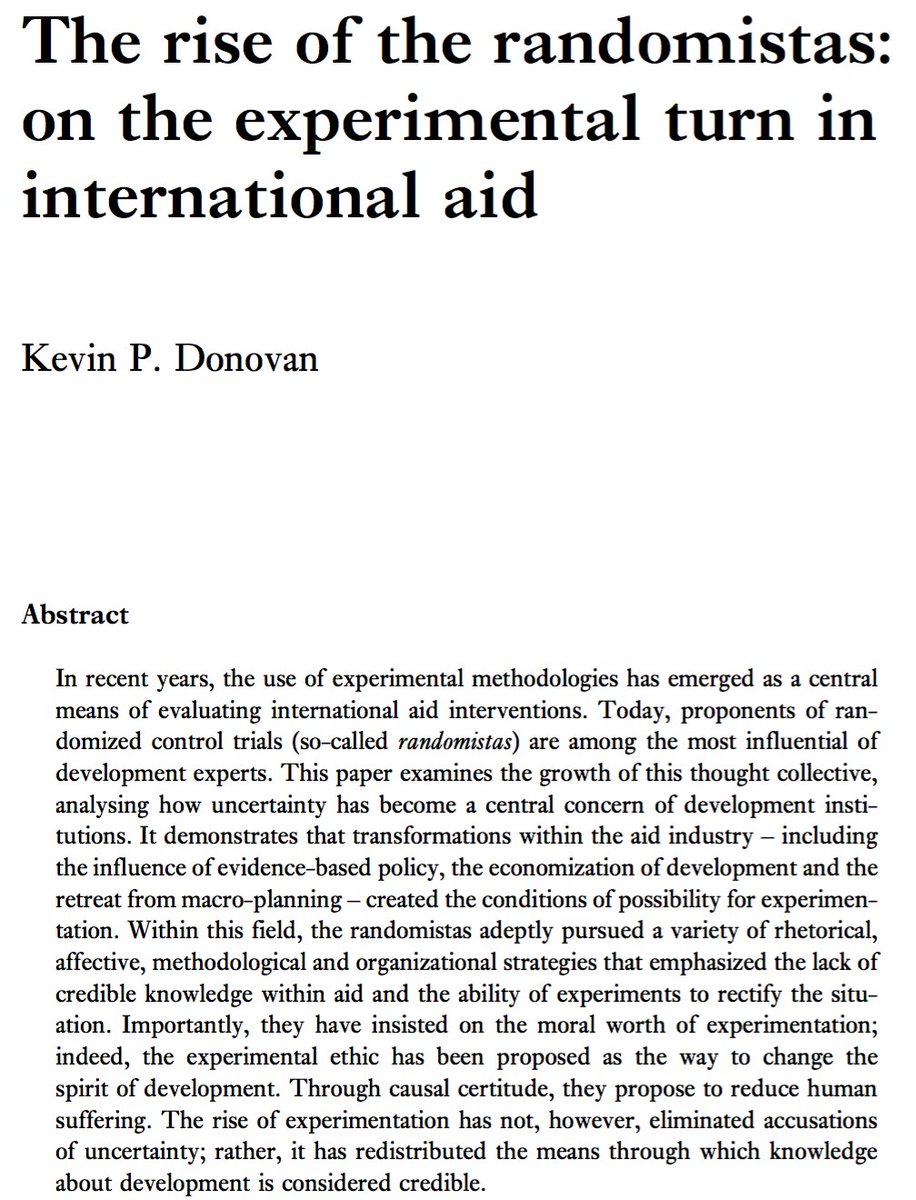A new working paper by World Bank economists is rightly provoking the ire of critics like @EconKilljoy, @gchelwa, @godwinmurunga, and @peripheralecon.
The paper reports the results of a randomised controlled trial (RCT) that, in part, "encouraged" payment by disconnecting water if money was not received.
For many, this is an example of experimenting on the poor. Such experimental methods have risen to fashion thanks to the well-funded advocacy of development economists in the past two decades.
I’m no fan of these methods and have documented the rhetorical and emotional tactics these economists used to redistribute resources and expertise. https://doi.org/10.1080/03085147.2018.1432153">https://doi.org/10.1080/0...
But in focusing the criticism of this noxious paper on the method, we play on the stage the randomistas have set.
Part of the rhetorical work of the randomistas was to narrow the frame of what counts as development expertise.
They had plenty of help: orthodox economists already held the most prestige at World Bank et al. and the neoliberal centrism of the 2000s wanted technocratic fixes.
They had plenty of help: orthodox economists already held the most prestige at World Bank et al. and the neoliberal centrism of the 2000s wanted technocratic fixes.
This is what made the ‘what works’ slogan of Duflo, Banerjee, et al. so compelling — not only to IFIs and major foundations, but also smaller NGOs and governments in the South (and, eventually, the North).
RCTs articulated with & #39;the end of history& #39; and promised a way through ‘ideology’ and ‘politics& #39; (which the randomistas used as slurs).
You see such anti-politics in the justification of the authors of this new paper.
In their hastily composed "Ethics Comment," they write of a "policy crisis" in Nairobi due to a "culture of nonpayment" in "slums." https://drive.google.com/file/d/1o0QibzPHUG1A_cTessYyeVn90429ejAQ/view">https://drive.google.com/file/d/1o...
In their hastily composed "Ethics Comment," they write of a "policy crisis" in Nairobi due to a "culture of nonpayment" in "slums." https://drive.google.com/file/d/1o0QibzPHUG1A_cTessYyeVn90429ejAQ/view">https://drive.google.com/file/d/1o...
The authors claim they were only "help[ing] a government sort out a real-world problem."
Here we have the urgent solution-seeking that characterizes randomistas. There is a crisis and experimentation can explain how to solve it.
Here we have the urgent solution-seeking that characterizes randomistas. There is a crisis and experimentation can explain how to solve it.
Yet, experimentation only gives the most narrow of answers. As the study authors note, they support "standard policies that many governments use over the world."
Remember, the narrowness is by design: the randomistas want to eliminate context -- in their search for causality -- and certainly have no time for politics.
So, when the debate on water repayment becomes a debate about RCTs -- rather than about the politics of rights -- it is narrowed in exactly the way the randomistas desired.
Instead, the questions should be:
Why is water in Nairobi privatised?
Why are basic goods framed as commodities for sale?
Why is the right to water evacuated for the drip drip drip of markets?
How can Kenya learn from struggles, in RSA, eg, for fighting prepaid water?
Why is water in Nairobi privatised?
Why are basic goods framed as commodities for sale?
Why is the right to water evacuated for the drip drip drip of markets?
How can Kenya learn from struggles, in RSA, eg, for fighting prepaid water?
Kenya& #39;s is a story of structural adjustment, yes, and false necessity flying under the flag of crisis.
But it is also of internally imposed austerity by Kenyan bureaucrats, politicians, and opportunists.
But it is also of internally imposed austerity by Kenyan bureaucrats, politicians, and opportunists.
Nairobians know this! Just ask about cartels and mkokoteni and boreholes.
If a researcher cared to understand the political economy of water in Nairobi, they could do so.
The trouble is, that series of questions could never be asked as an RCT.
The trouble is, that series of questions could never be asked as an RCT.
An RCT is valued by the randomistas precisely because it eliminates power and history, context and contestation.
It trades development for solutions, and politics for ethics.
It trades development for solutions, and politics for ethics.
And because of this, it is precisely the sort of expertise amenable to rent seekers and those who turn rights into commodities.
It& #39;s no accident Nairobi Water wants to work with these scholars for 6 years.
It& #39;s no accident Nairobi Water wants to work with these scholars for 6 years.
In other words, the problem is ethical and methodological, sure, but only because more foundational problems are so sedimented.
Making water a right and turning municipal governments into responsive administrations are the real challenge.
Making water a right and turning municipal governments into responsive administrations are the real challenge.
If those were the grounds on which we were debating, experimental methods would be a curiosity, rather than a tactic for justifying the disconnection of water to the poor.
(As @EmilyBBrownell put it, there’s no IRB for capitalism.)

 Read on Twitter
Read on Twitter



